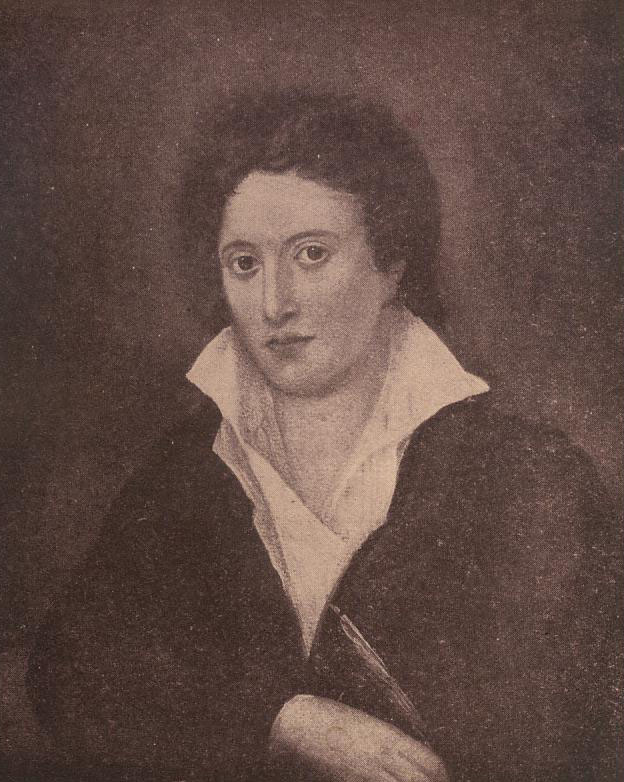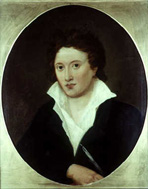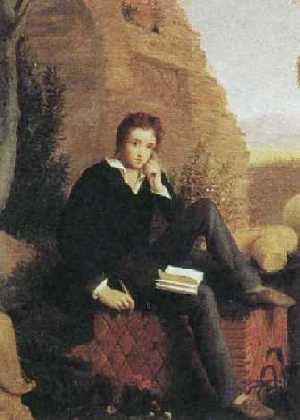Percy Bysshe Shelley
(1792 - 1822)

If the idea of a being not of our soil fallen into the material life
and still remembering his skies can be admitted
as an actual fact of human birth, then Shelley
was certainly a living example of one of these
luminous spirits half obscured by earth.
SRI AUROBINDO
I can give not what men call love;
But wilt thou accept not
The worship the heart lifts above
And the Heavens reject not, —
The desire of the moth for the star,
Of the night for the morrow,
The devotion to something afar
From the sphere of our sorrow?
Sri Aurobindo’s remarks:
«I suppose it would not be easy to find a more perfect example of psychic inspiration in English literature than Shelley’s well-known lines,
I can give not what men call love...
— you will find there the true rhythm, expression and substance of poetry full of the psychic influence.»
«Shelley says in substance: “Human vital love is a poor inferior thing, a counterfeit of true love, which I cannot offer to you. But there is a greater thing, a true psychic love, all worship and devotion, which men do not readily value, being led away by the vital glamour, but which the Heavens do not reject though it is offered from something so far below them, so maimed and ignorant and sorrow-vexed as the human consciousness which is to the divine consciousness as the moth is to the star, as the night is to the day. And will you not accept this from me, you, who in your nature are kin to the Heavens, you, who seem to me to have something of the divine nature, to be something bright and happy and pure far above the sphere of our sorrow?”. Of course, all that is not said but only suggested, but it is obviously the spirit of the poem, — and it is this spirit in it that made me write the other day that it would be perhaps impossible to find in English literature as a more perfect example of psychic inspiration than these eight lines.»
«In the valuation of whole poems Shelley’s Skylark may be described as a greater poem then his brief and exquisite lyric — “I can give not what men call love” — because of its greater range and power and constant flow of unsurpassable music, but it is not more perfect; if we take separate lines and passages, the stanza “We look before and after” is not superior in perfection or absoluteness to that in the other poem “The desire of the moth for the star”, even though it strikes a deeper note and may be said to have a richer substance.»
«Shelley was not a spiritual poet and the Skylark is not a spiritual lyric. Shelley looked, it is true, always towards the light, towards a beauty, a truth behind the appearance of things, but he never got through the idealising mind to the spiritual experience. What he did get was something of the purest emotional or aesthetic feeling or purest subtle mind-touch of an essence behind the appearance, an essence of ideal light, truth or beauty. It is that he expresses with a strange aerial magic or a curious supersensuously sensuous intensity in his finest lyrics. It is that we must seek in the Skylark and, if we find it, we have no right to claim anything else. It is there all through and in abundance — it is its perfection that creates the sustained perfection of the poem. There is not and there ought not be an intellectual sequence, a linked argument, a logical structure. It is a sequence of feeling and of ideal perceptions whith an occult logic of their own that sustains the lyrics and makes it a faultless whole. […] Shelley was not only a poet of other world, of Epipsychidion and of The Witch of Atlas; he was passionately interested in bringing the light, beauty and truth of the ideal super-world from which he came into the earth life — he tried to find it there wherever he could, he tried to infuse it wherever he missed it. The mental, the vital, the physical cannot be left out of the whole he saw in order to yield place only to the ethereal and impalpable. As he heard the skylark and felt the subtle essence of light and beauty in its song, he felt too the call of the same essence of light and beauty elsewhere and it is the things behind which he felt it that he compares to the hymn of the skylark — the essence of ideal light and beauty behind things mental, the poet and his hymns, nehind things vital, the soul of romantic love, behind things physical, the light of the glow-worm, the passionate intensity of the perfume of the rose. I cannot see an ordinary glow-worm in the lines of Shelley’s stanza — it is a light from beyond finding expression in that glimmer and illumining the dell of dew and the secrecy of flowers and grass that is there. This illumination of the earthly mind, vital, physical with his super-world light is a main part of Shelley; excise that and the whole of Shelley is not there, there is only the ineffectual angel beating his wings in the void; excise it from the Skylark and the true whole of the Skylark is no longer there.»
«Take Shelley’s stanza —
We look before and after,
And pine for what is not:
Our sincerest laughter
With some pain is fraught;
Our sweetest songs are those that tell of saddest thought.
This is perfect poetry with the most exquisite melody and beauty of wording and an unsurpassable poignancy of pathos, but there is no touch or note of the Overhead inspiration: it is the mind and the heart, the vital emotion, working at their highest pitch under the stress of a psychic inspiration. The rhythm is of the same character, a direct, straighforward, lucid and lucent movement welling out limpidly straight from the psychic source.»

To a Skylark
Hail to Thee, blithe Spirit!
Bird thou never wert,
That from Heaven, or near it,
Pourest thy full heart
In profuse strains of unpremeditated art.
Higher still and higher
From the earth thou springest
Like a cloud of fire;
The blue deep thou wingest,
And singing still dost soar, and soaring ever singest.
In the golden lightning
Of the sunken sun,
O’er which clouds are bright’ning,
Thou dost float and run;
Like an unbodied joy whose race is just begun.
The pale purple even
Melts around thy flight;
Like a star of Heaven,
In the broad daylight
Thou art unseen, but yet I hear thy shrill delight,
Keen as are the arrows
Of that silver sphere,
Whose intense lamp narrows
In the white dawn clear
Until we hardly see — we feel that it is there.
All the earth and air
With thy voice is loud,
As, when night is bare,
From one lovely cloud
The moon rains out her beam, and Heaven is overflow’d.
What thou art we know not;
What is most like thee?
From rainbow clouds there flow not
Drops so bright to see
As from thy presence showers a rain of melody.
Like a Poet hidden
In the light of thought,
Singing hymns unbidden,
Till the world is wrought
To sympathy with hopes and fears it heeded not:
Like a high-born maiden
In a palace-tower,
Soothing her love-laden
Soul in secret hour
With music sweet as love, which overflows her bower:
Like a glow-worm golden
In a dell of dew,
Scattering unbeholden
Its aëreal hue
Among the flowers and grass, which screen it from the view!
Like a rose embowered
In its own green leaves,
By warm winds deflowered,
Till the scent it gives
Makes faint with too much sweet those heavy-wingèd thieves:
Sound of vernal showers
On the twinkling grass,
Rain-awakened flowers,
All that ever was
Joyous, and clear, and fresh, thy music doth surpass:
Teach us, Spirit or Bird,
What sweet thoughts are thine:
I have never heard
Praise of love or wine
That panted forth a flood of rapture so divine.
Chorus Hymeneal,
Or triumphant chant,
Matched with thine would be all
But an empty vaunt,
A thing wherein we feel there is some hidden want.
What objects are the fountains
Of thy happy strain?
What fields, or waves, or mountains?
What love of thine own kind? what ignorance of pain?
With thy clear keen joyance
Languor cannot be:
Shadow of annoyance
Never came near thee:
Thou lovest — but ne’er knew love’s sad satiety.
Waking or asleep,
Thou of death must deem
Things more true and deep
Than we mortals dream,
Or how could thy notes flow in such a crystal stream?
We look before and after,
And pine for what is not:
Our sincerest laughter
With some pain is fraught;
Our sweetest songs are those that tell of saddest thought.
Yet is we could scorn
Hate, and pride, and fear;
If we were things born
Not so shed a tear,
I know not how thy joy we ever should come near.
Better than all measures
Of delightful sound,
Better than all treasures
That in books are found,
Thy skill to poet were, thou scorner of the ground!
Teach me half the gladness
That thy brain must know,
Such harmonious madness
From my lips would flow
The world should listen then — as I am listening now.

